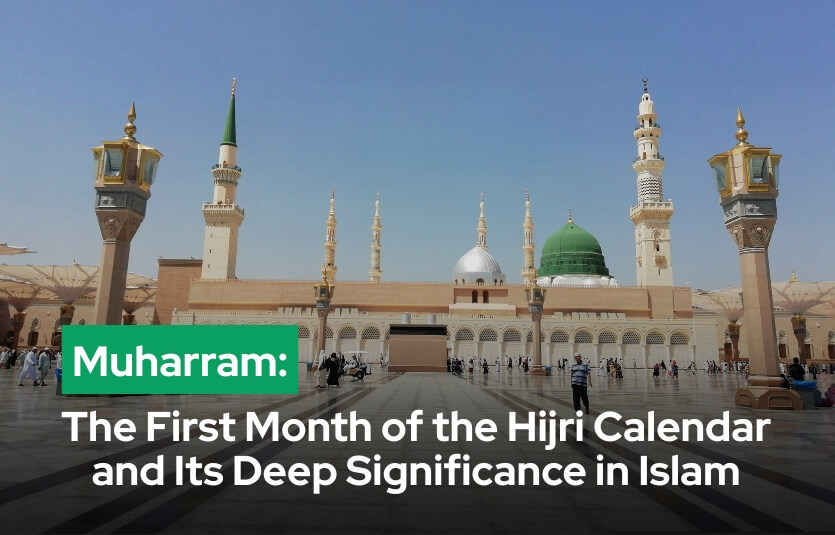
Muharram: The First Month of the Hijri Calendar and Its Deep Significance in Islam
Introduction
The Islamic calendar, also known as the Hijri calendar, begins with the month of Muharram. Far more than just the start of a new year, Muharram holds deep spiritual, historical, and moral significance in Islam. It is a sacred month mentioned in the Quran, honored by the Prophet Muhammad (peace be upon him), and remembered for the important historical events that unfolded within it. In this blogpost, we will explore the religious significance of Muharram, the importance of the Day of Ashura, and how Muslims can draw lessons from this month for spiritual renewal and moral guidance.
The Religious Significance of Muharram
Muharram: A Sacred Month in Islam
The Quran clearly states that there are four sacred months in Islam. Allah SWT said in the Quran: إِنَّ عِدَّةَ الشُّهُورِ عِندَ اللَّهِ اثْنَا عَشَرَ شَهْرًا فِي كِتَابِ اللَّهِ يَوْمَ خَلَقَ السَّمَاوَاتِ وَالْأَرْضَ مِنْهَا أَرْبَعَةٌ حُرُمٌ ذَلِكَ الدِّينُ الْقَيِّمُ فَلَا تَظْلِمُوا فِيهِنَّ أَنفُسَكُمْ “Indeed, the number of months with Allah is twelve [lunar] months in the register of Allah from the day He created the heavens and the earth; of these, four are sacred. That is the correct religion, so do not wrong yourselves during them.” (Surah At-Tawbah 9:36)The Prophet Muhammad ﷺ (peace be upon him) explained that Muharram is one of these four sacred months. He said: “أَلا إِنَّ الزَّمَانَ قَدِ اسْتَدَارَ كَهَيْئَتِهِ يَوْمَ خَلَقَ اللَّهُ السَّمَاوَاتِ وَالأَرْضَ، السَّنَةُ اثْنَا عَشَرَ شَهْرًا، مِنْهَا أَرْبَعَةٌ حُرُمٌ، ثَلاثٌ مُتَوَالِيَاتٌ: ذُو الْقَعْدَةِ، وَذُو الْحِجَّةِ، وَالْمُحَرَّمُ، وَرَجَبُ مُضَرَ الَّذِي بَيْنَ جُمَادَى وَشَعْبَانَ” “Verily, time has come back to its original state as it was the day Allah created the heavens and the earth. The year is twelve months, of which four are sacred: three consecutive — Dhul-Qadah, Dhul-Hijjah, and Muharram — and Rajab (of the tribe of Mudar), which comes between Jumada and Shaban.” (Sahih Bukhari, 4662)
Muharram is Called “The Month of Allah”
The Prophet Muhammad ﷺ (peace be upon him) explicitly emphasized Muharram’s sacredness. He said: أَفْضَلُ الصِّيَامِ بَعْدَ رَمَضَانَ شَهْرُ اللَّهِ الْمُحَرَّمُ “The best fasting after Ramadan is in the Month of Allah, Muharram.” (Sahih Muslim 1163) This narration not only praises the act of fasting in this month but also shows how uniquely the Prophet ﷺ (peace be upon him) referred to it as the “Month of Allah.”
The Day of Ashura and Its Historical Roots
The 10th day of Muharram, known as Ashura (Yawm Ashura), is one of the most important days in the Islamic calendar. According to authentic hadith, the Prophet Muhammad ﷺ (peace be upon him) fasted on this day and encouraged Muslims to do so: عن أبي قَتَادَةَ أَنَّ رَسُولَ اللَّهِ سُئِلَ عَنْ صِيامِ يَوْمِ عَاشورَاءَ فَقَالَ: يُكَفِّرُ السَّنَةَ الْمَاضِيَةِ “Fasting the day of Ashura, I hope Allah will expiate the sins of the previous year.” (Sahih Muslim 1162) When the Prophet ﷺ (peace be upon him) arrived in Madinah and saw the Jews fasting on Ashura, he asked them why they were fasting? They replied: هَذَا يَوْمٌ صَالِحٌ هُوَ يَوْمٌ نَجَّى اللَّهُ فِيهِ مُوسَى وَبَنِي إِسْرَائِيلَ مِنْ عَدُوِّهِمْ…، فَصَامَهُ مُوسَى شُكْرًا “This is a righteous day. It is the day when Allah saved Musa and the Children of Israel from their enemy… so Musa fasted on this day out of gratitude to Allah.” (Sahih al-Bukhari 2004) The Prophet ﷺ (peace be upon him) responded: نَحْنُ أَحَقُّ بِمُوسَى مِنْهُمْ فَصَامَهُ وَأَمَرَ بِصِيَامِهِ “We have more right to Musa than they do.” So he fasted on that day and ordered the Muslims to fast as well. (Sahih al-Bukhari 2004) He also intended to distinguish the Muslim practice by recommending fasting on the 9th or 11th along with the 10th. The beloved prophet Muhammad peace be upon him said: لَئِنْ بَقِيتُ إِلَىٰ قَابِلٍ، لَأَصُومَنَّ التَّاسِعَ “If I remain till next year, I will fast the 9th as well.” (Sahih Muslim 1134)
Myths and Misconceptions: A Critical Look at Events Attributed to Ashura
In many sermons and gatherings, various significant historical and prophetic events are often linked to the Day of Ashura. Among the events frequently mentioned by some preachers and Khatibs are the following:
- The creation of the heavens and the earth
- The acceptance of the repentance of Adam (alayhis salam)
- The Ark of Nuh (alayhis salam) coming to rest on Mount Judi
- The salvation of Yunus (alayhis salam) from the belly of the whale
- Yusuf (alayhis salam) being taken out of the well
- Isa (alayhis salam) being born and raised to the heavens
- The forgiveness of Dawud (alayhis salam)
- The return of Yaqub’s (alayhis salam) eyesight
- The birth or deliverance of Ibrahim (alayhis salam) from the fire
- The sacrifice of Ismail (alayhis salam) being substituted with a ram
- The complete forgiveness of Prophet Muhammad ﷺ (peace be upon him)
- The exodus of Musa (alayhis salam) and the saving of Bani Israil from Firawn
While these stories are commonly circulated, it is important to clarify that most of these reports are not supported by authentic chains of narration or acceptable hadith sources. Scholars of hadith and Islamic tradition have scrutinized such claims, and except for the Exodus of Musa (alayhis salam)—which has been authentically reported in Sahih al-Bukhari and Sahih Muslim—the remaining events do not have sound evidence linking them specifically to the day of Ashura. Prominent scholars of hadith Imam Ibn al-Jawzi, in his authoritative work Al-Mawduat (vol. 2, p. 201), explicitly classified these types of narrations such as the creation of the heavens, the earth, and other significant occurrences as fabricated (mawdu). Similarly, Ibn al-Qayyim al-Jawziyyah reinforced this assessment in Al-Manar al-Munif (p. 39), where he also highlighted the fabrication of hadiths that attribute the creation of the world to the Day of Ashura.
Similarly, Mawlana Fadl al-Rahman al-Azami, a renowned contemporary hadith expert, highlights in his book “Muharram and Ashura: Virtues and Laws” (p. 20) that many of these supposed virtues of Ashura are in fact fabrications or weak narrations. Among the fabricated attributions, he includes the claim that:
- Adam’s (alayhis salam) repentance was accepted on this day,
- Nuh’s (alayhis salam) Ark came to rest on Mount Judi,
- Ibrahim (alayhis salam) was saved from the fire,
- The ram was sent in place of Ismail (alayhis salam), and
- Yusuf (alayhis salam) was reunited with his father Yaqub (alayhis salam) on this day.
These have no reliable basis in the primary sources of Islam, such as the Sahih collections of al-Bukhari or Muslim, nor in widely accepted classical texts of fiqh and hadith criticism. These assertions have been further examined in modern research such as Bilal Ali’s article, “The Attribution of Prophetic Events to the Day of Ashura.” As emphasized by Ibn al-Qayyim al-Jawziyyah (d. 751 AH) in Al-Manar al-Munif (p. 103), “There is nothing proven from the Prophet ﷺ (peace be upon him) regarding any reward or virtue of the Day of Ashura apart from the fasting on that day.”
The Martyrdom of Imam Husain (RA) and the Lessons of Karbala
On the 10th of Muharram, 61 AH, Imam Husain (RA), the beloved grandson of the Prophet ﷺ (peace be upon him), was brutally martyred at Karbala. While this event is not the basis for Ashura’s religious merit, it holds great emotional and moral value in Muslim memory. Imam Husain’s stance against tyranny, injustice, and political corruption continues to inspire generations of Muslims. His legacy reminds us that:
- Truth should not be compromised
- Oppression must be resisted
- Faith and moral principles are worth every sacrifice
Conclusion: Honoring Muharram with Purpose
Muharram is not merely the start of a new calendar year, but a sacred opportunity for renewal — of taqwa, repentance, and commitment to justice. By fasting on Ashura, avoiding sins, and reflecting on the values of the Prophet ﷺ (peace be upon him) and Imam Husain (RA), we can make this month spiritually meaningful. اللهم اجعل بداية سنتنا هذه خيرًا، وارزقنا فيها الهدى والبركة والتوفيق O Allah, make the beginning of this year good for us, and grant us guidance, blessing, and success in it.
References
- Al-Azami, F. R. (2001) Muharram and Ashura: Virtues and Laws. Academy for the Revival of the Sunnah.
- Al-Bukhari, M. I. (2018). Sahih al-Bukhari. Muassasah Ar Risalah.
- Al-Jawziyyah, I. Q. (n.d.) Al-Manar al-Munif. Daur Alam al Fawaeed.
- Bilal Ali. (n.d.) The Attribution of Prophetic Events to the Day of Ashura. Retrieved from The Attribution of Prophetic Events to the Day of Ashura – Bilal Ali
- Ibn al-Jawzi, A. R. (1966) Al-Mawduat. Al Maktaba as Salafiah.
- Muslim, I. H. (1955). Sahih Muslim. Dauru Ihiya at turas al Arabi.
